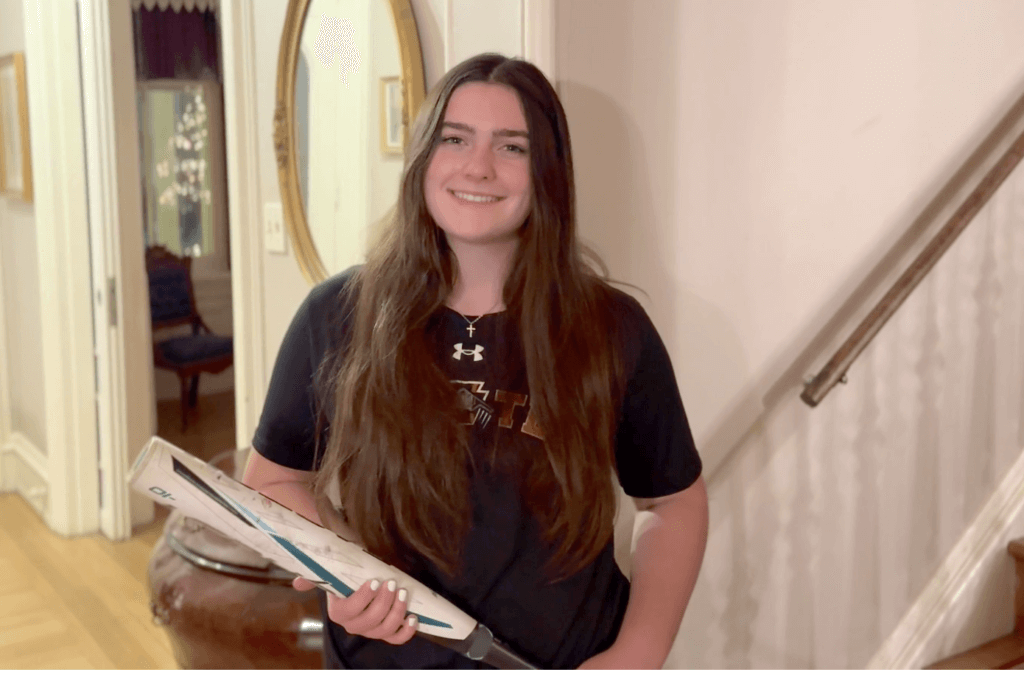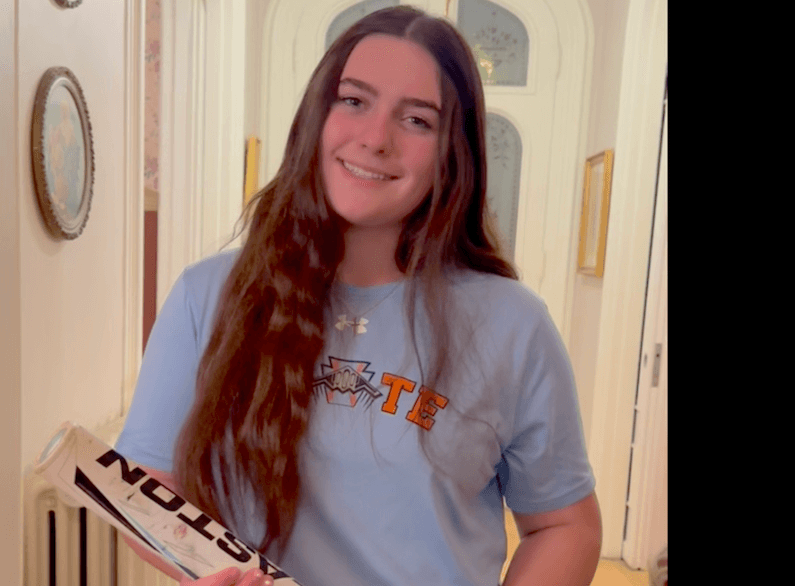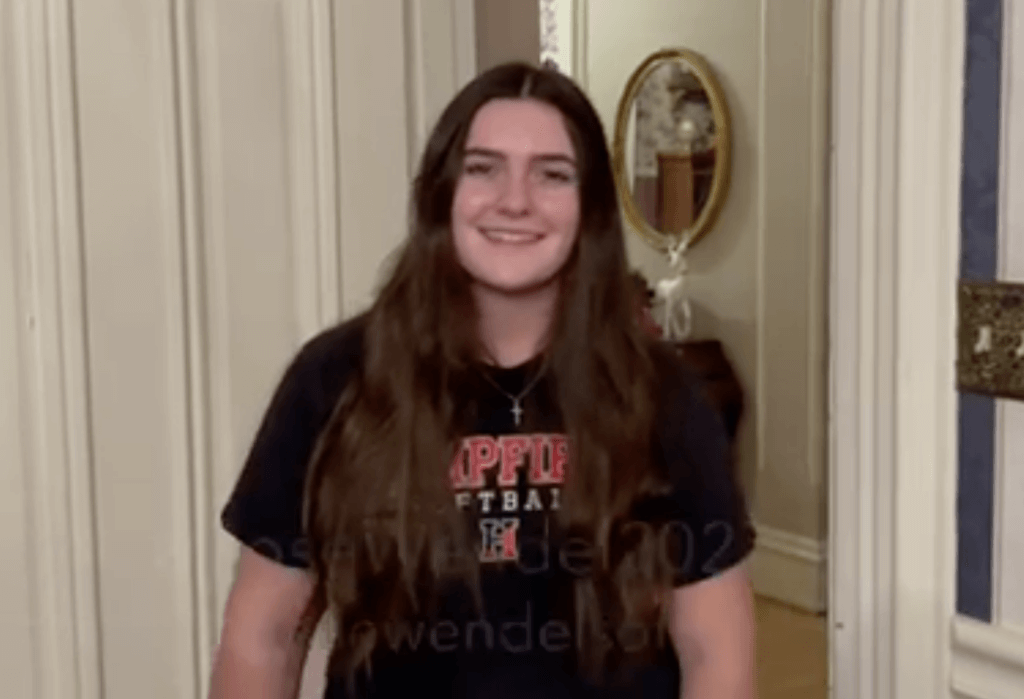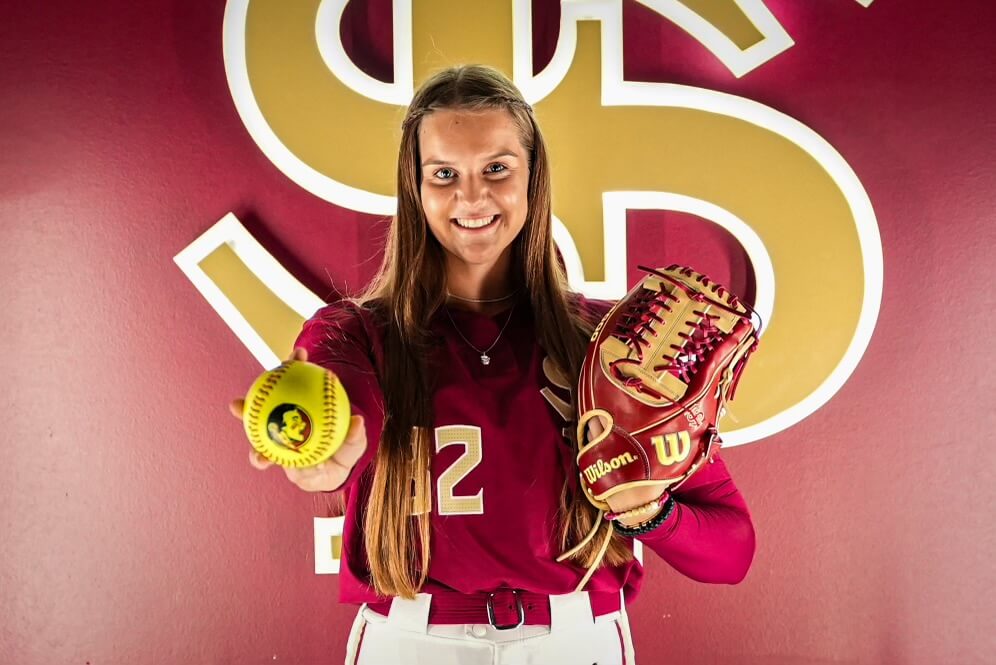
If you have followed Extra Inning Softball recently, you’ve seen that we’re all about honoring those who are selflessly doing their part to help bring under control the awful COVID-19 pandemic which just in the last day has surpassed the 50,000 death mark in the U.S. and 200,000 world-wide due to the effects of the coronavirus.
Today, we’re honoring Lovie Jung, the legendary college All-American and Olympic Gold Medal winner who was featured in a great article on the Arizona Wildcat website published earlier this month (April 4, 2020) and promoted this week by USA Softball.
I had a chance to work with Lovie a few years ago as we called college softball games together –I did play-by-play and she did color commentary–at the Judi Garman Classic held on the Cal State Fullerton campus and later with the Louisville Slugger Hit Clu . I really enjoyed talking with her between games, more about family and kids than softball!
Lovie is smart, well-spoken and a great role model for young female athletes as you’ll see in her Q&A below. Here’s the article with photos courtesy of the Riverside Fire Department and Arizona Athletics…
— Brentt Eads, Extra Inning Softball
*****
One of the best hitters in Arizona history, Lovie Jung left her legacy in two seasons in Tucson in 2002 and 2003. Now, nearly two decades later, Jung’s legacy has taken a different path. As a firefighter for the City of Riverside Fire Department, Jung is among those on the front lines helping to fight the COVID-19 global pandemic.

In two seasons at Arizona, the shortstop hit a career .409, 10th best average in Arizona history, with 41 home runs; she holds the UA career record for slugging percentage (1.022). In 2003, she put together one of the best single seasons in NCAA history, hitting .461 while leading the country in both home runs (25) and RBI (79), nearly taking home the Pac-10 triple crown in the process. She remains the only player in UA history to hit .450 or better with 25 or more home runs in a season.
Following a collegiate career that featured two years at Fresno State and two years at Arizona, Jung continued her softball career with both in the National Pro Fastpitch as well as an international stint that stretched two Olympic games, helping USA win a gold medal in 2004 and a silver medal in 2008. Following her incredibly accomplished softball career, Jung traded in her softball uniform for Personal Protection Equipment and traded in her bat and glove for medical tools.
Jung has been working for the City of Riverside Fire Department. After nine years as a firefighter/paramedic, Jung was recently promoted to Engineer. Now, in a time of global crisis, Jung is putting her health and safety on the line for her community and being a female leader in the field as well.
*****
LOVIE JUNG Q&A:
First of all, how are you and your family doing? Everyone healthy?
Everyone is good and healthy. Initially, we felt very overwhelmed due to my daughter’s school closing. It was frustrating and devastating for us. My daughter loves going to school and we are not teachers by any means. We took some time off and decided to regroup. Hopefully, over time we can figure out something that works for all of us.
What types of precautions are you taking in the wake of COVID-19?
My biggest fear is being infected at work and then infecting my family and daughter. I constantly wash my hands and take the extra personal protective equipment seriously. We are constantly wiping everything down at work. The station, doors, handles and the rig. During my drive home, I get very emotional because, I’m not sure if it will be me infecting my family. They are self-isolating at home. But, I’m heading to work every day and possibly putting myself in danger. When I get home, I change my clothes in the garage and remove my shoes. I immediately take a shower and try not to interact with my family beforehand.
What have these past few weeks been like for you at work?
My job has risks associated with it. The risks have always been there. The pandemic has increased those risks on the medical side. We still have our fire risks as well. The implications are and have always been there. We all knew what we were signing up for when we took the job. Most of the calls have turned into sick patients but that has not changed our stance on how we serve the community. We are a workforce committed to keeping our community safe.
You, along with medical professionals working in hospitals all across the world, have been on the frontlines and have seen that most of the world has not seen. Do you have a message for the general public on the severity of what you’ve seen and experienced firsthand?
Please #stayhome. We are a little naive to believe our hospitals across the country can handle the influx of patients we will see in the upcoming months. We are resilient and I believe we all can do our part to help the people on the frontlines working tirelessly to keep everyone safe. Follow your local and state guidelines. Hopefully this is for a short period of time. But if we do not do our part, it will take longer to recover and the #stayhome orders will be extended.
From the bottom of my heart thank you to everyone who is vitally important during this time. Front line health care workers are saving lives. Essential workers are keeping us healthy and fed. Parents, moms, dads and family members are raising and homeschooling our kids. Please stay safe and healthy!
Coach (Mike) Candrea is well known for preparing his players for life after softball. What did you take from your time with him that prepared you for this time of crisis?
Life is bigger than the sport I played. I would be lying if I told you I understood this fact during my time as an athlete. I didn’t. I was in my little softball bubble. Coach always told us, “Life is bigger than softball.” I realize that more as a firefighter. I see patients during their most vulnerable times. I see tragedy and heart break almost daily.
I also see humanity, compassion and love. I consider myself very fortunate to be part of a small group in the world. First responders on the front lines run into dangerous situations when everyone else is running the opposite direction. I love what I do and would not change it for the world.
During this time, we are better together. We can move mountains together. We cannot do this individually. We have to realize how much we rely on each other to keep our community safe. Our lives depend on each other.
How did your journey to becoming a firefighter begin?
I really didn’t know what I wanted to do when I knew I was going to retire from softball. To be honest, I was a little lost and scared. Most of my counter parts had done their internships and were now deep into their careers. I was late to the game and going to try and get a job at 29 years old.
During a trip to Japan with the USA Softball team, I sat down and joined one of the USA umpires for lunch. She asked if I was still interested in becoming a firefighter. I was honest and told her that I thought that ship had sailed. All of my competition was in their early 20’s and male. Which meant they were ahead of the game and physically stronger than me.
I was almost 30 and wasn’t sure if I would physically be capable of doing the job due to my age. She insisted I would be a great candidate and told me she worked as a firefighter in the State of Washington and was hired when she was 31.
At that moment something clicked. I didn’t have any mentors and I never saw any female firefighters doing the job. She instantly became a mentor and was my first role model. Once I saw the possibilities in front of me, I knew I could do it.

What was the process like to become a firefighter and what did you learn about yourself throughout the process?
The process was all but easy. There were many people who told me it was difficult to get a job in the fire service — and for good reason. It is very competitive and thousands of candidates apply for a few open positions. I decided to attack the process the same way I attacked being an athlete: 100 percent or nothing, no matter the outcome.
I started asking around and found out what qualifications and certificates I needed to apply for a job. Within two years, I had my EMT certification, Fire Academy certificate, a Paramedic License, and working for an ambulance company. During my time as an athlete, I knew I was disciplined and driven. During the process my discipline and drive really carried me through.
There were multiple times, I didn’t pass a written test and oral interview. At one point, I was hired but my academy date was canceled due to the recession. I kept going and eventually, I was hired by the City of Riverside Fire Department.
Throughout the process, my time as an athlete gave me a huge advantage. I didn’t quit when others did. I worked harder than anyone else out there. I was already accustomed to failure. The setbacks I faced did not deter me. They only made me stronger. In my mind, I never failed at anything, because I knew how to make adjustments to be successful. This is when I learned how important my journey was as an athlete.
How did your time as a student-athlete prepare you for your job and life now?
There are so many lessons I learned as an athlete that help me daily as a firefighter. I’ll try and keep them to a minimum:
1) Teamwork by far is the number one advantage I have. From Day 1, I learned how important the team is over self. The strength of an individual is in the team. And the strength of the team is in the individual.
2) Preparation, training and being detail oriented took 90 percent of my attention as an athlete. The same goes for firefighting. We spend most of our time training for high risk incidents.
3) Perseverance is my superpower. Something I acquired as an athlete because of all the setbacks I faced. Over time I learned they were part of the process and I became okay with them, as long as I figured out how to make an adjustment to overcome those setbacks. Nobody likes to fail, but it’s vitally important to understand why and how the failure happened. Failing is part of the process. If you are not failing, you not pushing yourself out of your comfort zone. This is where the magic happens.
4) Day after day, we were thrown in high pressure situations as athletes. Goals were made and then accomplished. This has helped me in the fire service. We are constantly in situations most people find unfathomable. Our reactions determine the atmosphere in which we work in. I can control my reactions and ignore what I can’t control. Something we hear daily as athletes.
5) Control what you can control. Ignore what you cannot control. This will save you so many hours of self-doubt.
Article originally published on ArizonaWildcats.com











